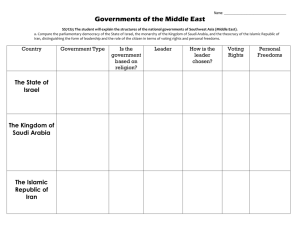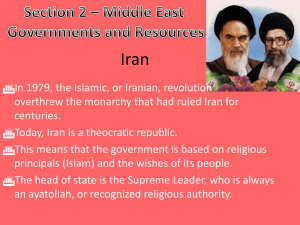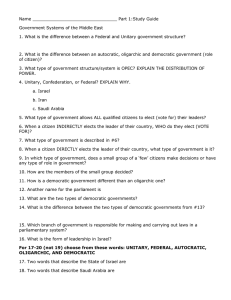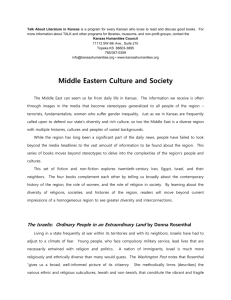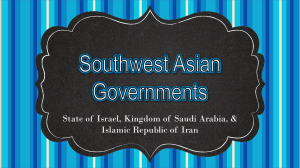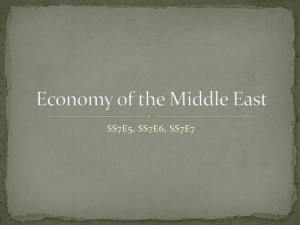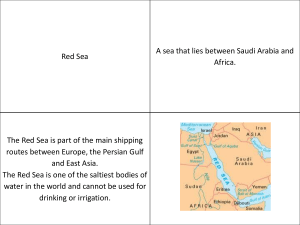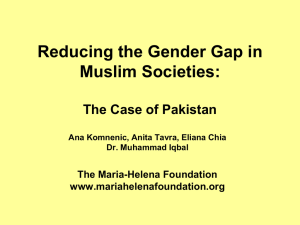Warm-up 10-25
advertisement
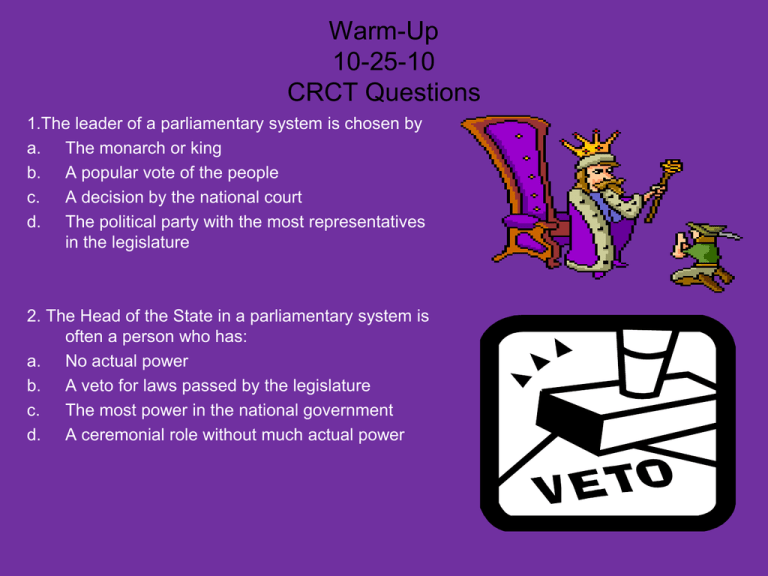
Warm-Up 10-25-10 CRCT Questions 1.The leader of a parliamentary system is chosen by a. The monarch or king b. A popular vote of the people c. A decision by the national court d. The political party with the most representatives in the legislature 2. The Head of the State in a parliamentary system is often a person who has: a. No actual power b. A veto for laws passed by the legislature c. The most power in the national government d. A ceremonial role without much actual power Standard • SS7CG5: The student will explain the structures of the national governments of Southwest Asia (Middle East). • Compare the parliamentary democracy of the State of Israel, the monarchy of the Kingdom of Saudi Arabia, and the theocracy of the Islamic Republic of Iran, distinguishing the form of leadership, and the role of the citizen in terms of voting rights and personal freedoms. Essential Question • How do autocratic, oligarchic, and democratic governments determine citizen participation? • How do the unitary, confederation and federal government systems distribute power? Israel - Type of Leader • Parliamentary Democracy. • The president is head of state and serves in a primarily ceremonial role (Shimon Peres). • The prime minister is the head of government (Benjamin Netanyahu). Israel – Becoming the leader • President is elected by the Knesset (Parliament). • After election, President nominates member of the Knesset to become the Prime Minister (following a vote of confidence from the Knesset). Israel – Role of Citizen • Citizens over 18 can vote for members of the unicameral legislature called the Knesset. Israel – Personal Freedoms • Freedom of Speech – Yes • Freedom of the Press - Yes Checking for Understanding Circle the correct answer A. Israel is a parliamentary democracy. B. President is elected by the Knesset (parliament). True or False True or False Saudi Arabia – Type of Leader • Islamic Absolute Monarchy. • King Abdullah bin Abdul Aziz Al Saud is the is the current King of Saudi Arabia and Head of the House of Saud. Saudi Arabia – Becoming the Leader • The right of succession is hereditary (passed down through the family). • A newly established council selects a successor among the crown princes of the Saudi royal family. • The King’s power is limited by Islamic law and he must build consensus among religious leaders and other influential Saudis. Saudi Arabia – Role of Citizen • The role of the citizen in Saudi Arabia is to obey the King. Saudi Arabia – Personal Freedoms • Freedom of Speech – No • Freedom of the Press - No • There are no voting rights or official political parties in this country. Checking for Understanding Circle the correct answer 1.The right of succession is hereditary (passed down through the family). 2. The role of the citizen in Saudi Arabia is to obey the King. True or False True or False Iran – Type of Leader • Iran is a theocratic republic with a presidential system. • The government of Iran is based on Islamic law. • The Supreme Leader of Iran, who is a religious leader, is chief of state and has final say on all matters. • The Supreme Leader is commander-in-chief of the armed forces. Iran – Becoming the Leader • The Supreme Leader is selected by the Council of Experts. • The Council of Experts, as well as the legislature and president, are elected by popular vote. • While the president is head of government, he may be removed by the Supreme Leader at any time. Iran – Role of Citizen • There is universal suffrage (voting) for everyone over 18. • The role of the citizen in Iran is to obey the Supreme Leader. Iran – Personal Freedoms • Freedom of Speech – No • Freedom of the Press - No Checking for Understanding Circle the correct answer 1. Iran is a theocratic republic with 2. The Supreme Leader is selected a presidential system. by the Council of Experts. True or False True or False Closing Round Robin- Students will be asked a question about today’s lesson. The student who answers the question will then compose the next question and call upon another classmate to answer his/her question. This will continue until all important information has been summarized. ( 10 mins)
